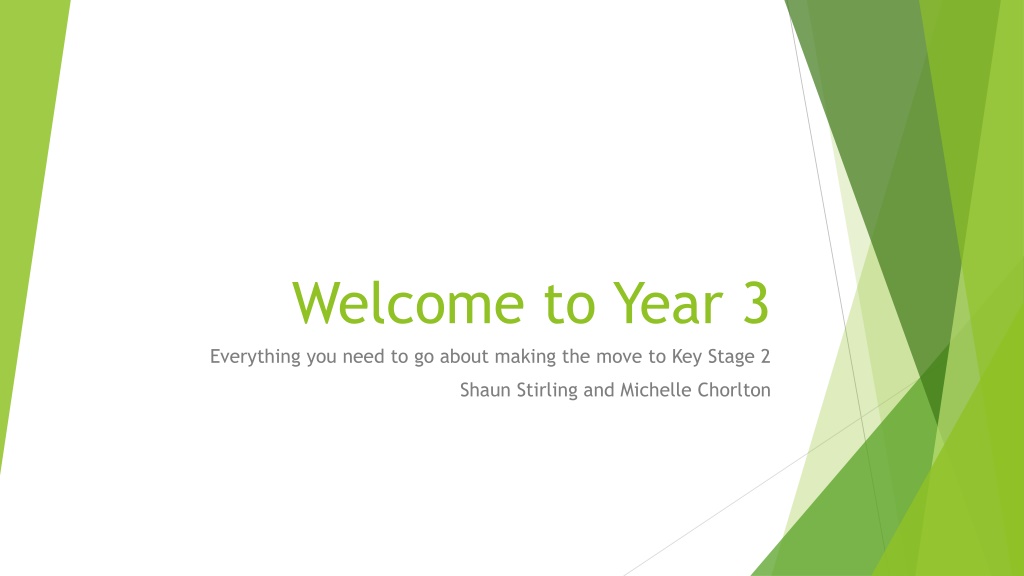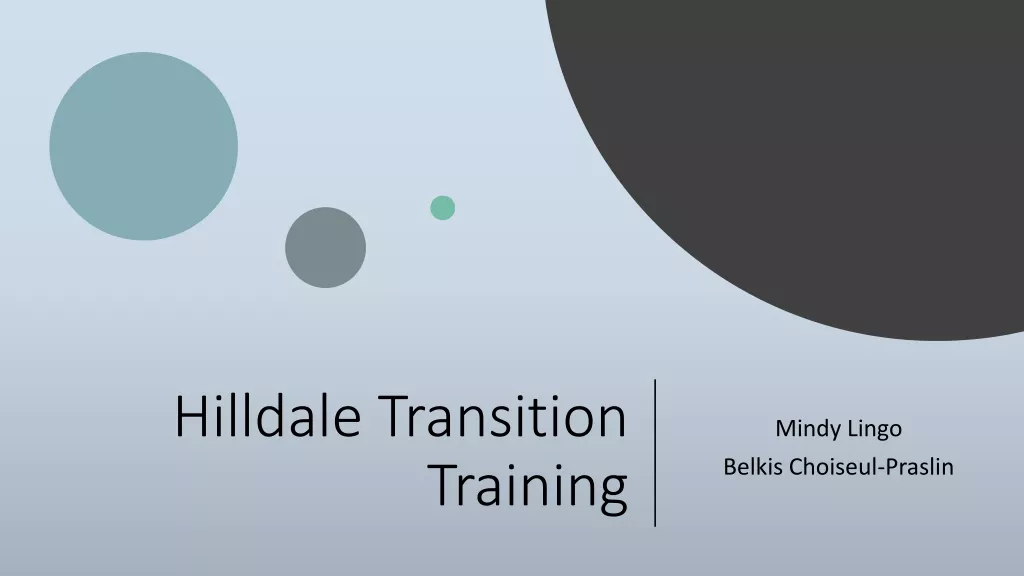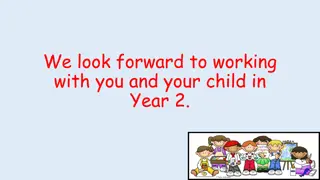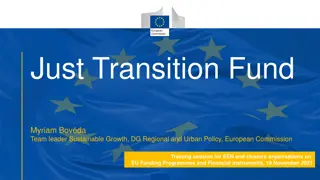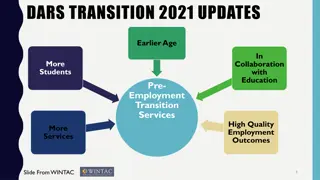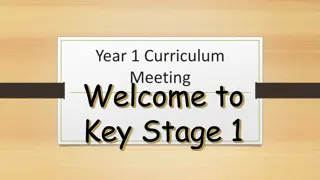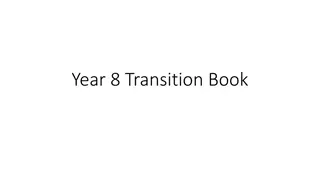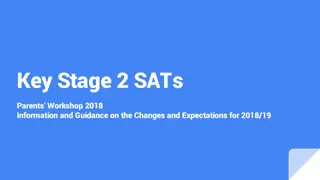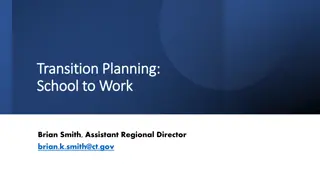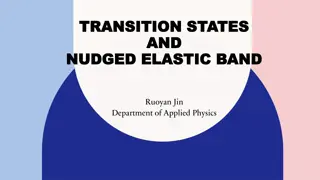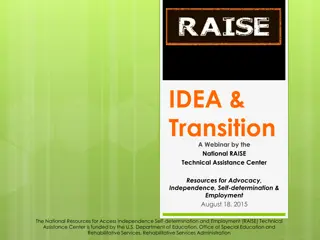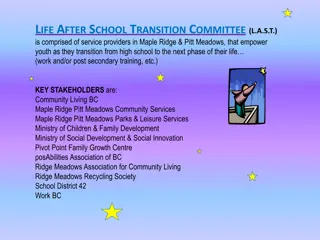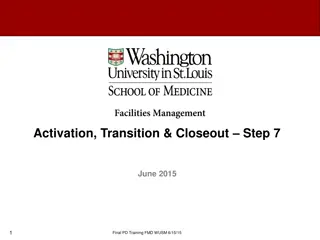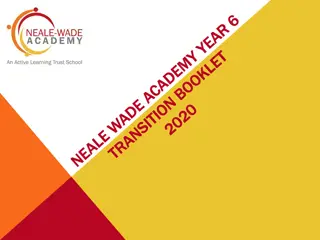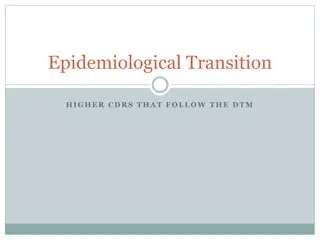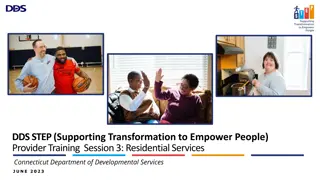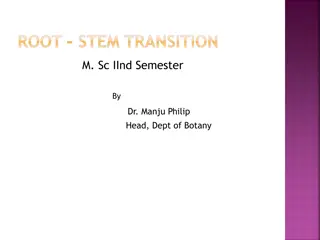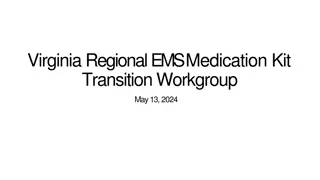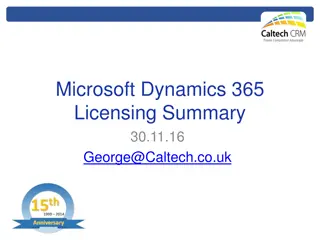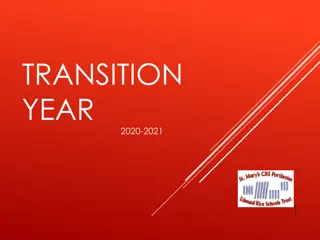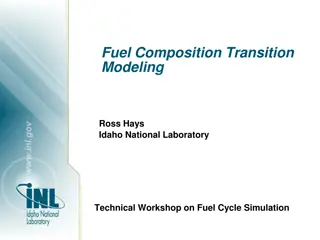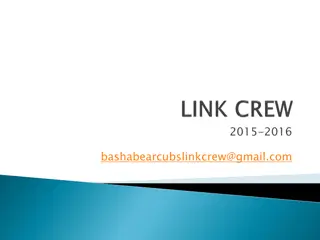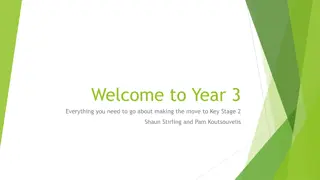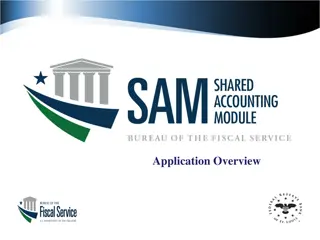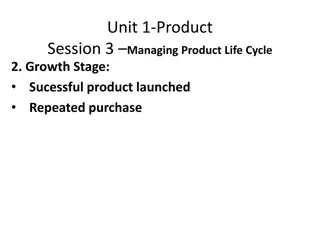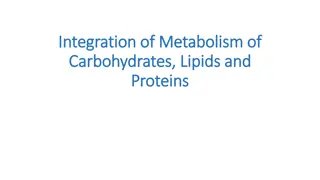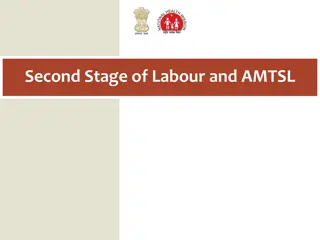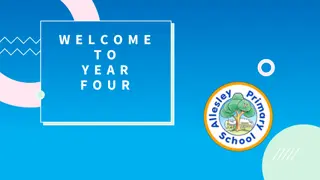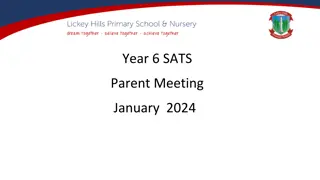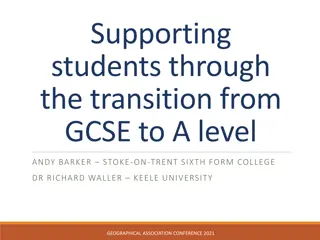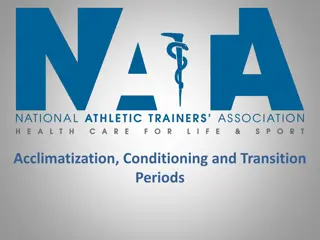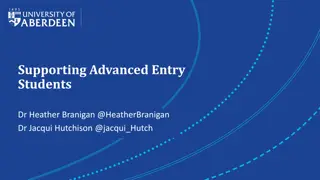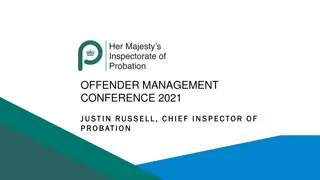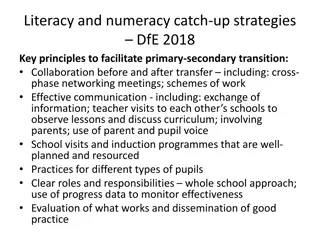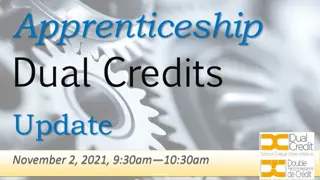Welcome to Year 3: A Guide for Key Stage 2 Transition
Extending a warm welcome to Year 3 families, this guide covers essential information on routines, PE, spellings, and more. The focus is on supporting each child's unique learning journey and ensuring a smooth transition to Key Stage 2.
Download Presentation

Please find below an Image/Link to download the presentation.
The content on the website is provided AS IS for your information and personal use only. It may not be sold, licensed, or shared on other websites without obtaining consent from the author. Download presentation by click this link. If you encounter any issues during the download, it is possible that the publisher has removed the file from their server.
E N D
Presentation Transcript
Welcome to Year 3 Everything you need to go about making the move to Key Stage 2 Shaun Stirling and Michelle Chorlton
We would like to extend a warm welcome to all of the family members of our current Year 3 classes. We are really looking forward to teaching your children this year and working with you to get the very best out of each individual. No two children s experience of the last five months will have been the same. Some children will have thrived with home learning whereas others, for a host of reasons, will have struggled with the enforced closure of school. The good news is that we are back and the children seem to have already settled down to their new lives in TheJuniors . This PowerPoint is aimed at giving you some information about timings, routines and expectations in Year 3. Normally all of this would be delivered at our Meet The Teacher event at the start of term and we are hugely disappointed that we are unable to deliver in person.
Physical Education In an attempt to minimise the children s belongings within the classroom, they now only need a single bag of kit for both indoor and outdoor PE. Most children have already brought this into school where it is stored in the classroom. On Wednesdays the children will do gymnastics and continue working toward the British Association of Gymnastics Awards (BAGA). On Thursday afternoons, the children will do outdoor games with Mrs Buchanan and staff from Progressive Sports. Each Friday morning the children put on their trainers to run on the field during Smile for a Mile .
We are using the field during both break and lunchtimes to ensure distancing between year group bubbles. Children need their trainers available to change from school shoes before and after these breaks. Consequently it is easier if the children have trainers available to them at all times. Unless requested, their PE bag and contents will stay in school throughout the term. Finally we find that the children become anxious early on about the prospect of school swimming lessons. Year 4 will be beginning these next week within current Covid restrictions so we hope to begin lessons with Year 3 in the Summer term (details to follow in the new year).
Spellings Your child may already have mentioned that we have assessed their ability to spell the most commonly occurring or high frequency words this week. We attach particular importance to the spelling of these words and children identified as needing additional support will receive help in learning these words. All children will receive a list of words each week. These will be drawn from the National Curriculum and will relate to the grammar and spelling lessons taught in school.
Times Tables By the end of this year, the children would normally be expected to be fluent in multiplication (and corresponding division facts) for the two, five, ten, three, four and eight times tables. Children may already be able to count in 2s or 5s, often using their fingers, to derive the answer to, for example six twos. This is different from knowing that six twos are twelve. If they know this then it is a simple step to recognise two sixes are twelve and that 12 6 = 2 and 12 2 = 6. To this end children will also be tested on their ability to recall these facts each week. We will introduce these beginning with the tables that the children are more likely to be familiar with i.e. tens and twos. Children who know these will progress more rapidly onto the other tables and division facts.
Both tables and spellings are assessed in a yellow test book on Monday so please ensure that your child has this in their bag. These books go back and forth between home and school together with the reading record (see below) and will give you an indication of how your child is getting along. We also plan to use PurpleMash 2Quiz during an IT slot to consolidate the weekly spellings and encourage you to use Times Tables Rock Stars (TTRS) to develop fluency.
Reading We really want to encourage a love of reading and would like every child to have three books with them in school at all times. 1. Their school reading book This will be chosen from the banded books kept in Mrs Chorlton s class. Children will have an opportunity to change their book from the selection on offer during daily quiet reading sessions after lunch.
2. A School library book Our lovely Key Stage 2 library is closed for the time being but Year 3 have a small library of books selected by Mrs Holt our librarian together with books belonging to Mr Stirling and Mrs Chorlton. This is kept in Mr Stirling s classroom.
3. A book or magazine from home. We want to acknowledge the reading going on outside of school so would like children to have something of their own to read. This could be a novel that they just can t put down or a magazine that they might receive as a subscription (anything from TheBeano to Aquila ) We are also making it a priority to find time to read stories aloud to the children at the end of the day. This is particularly easy this term while we study the work of Roald Dahl.
Children will be listened to at least once a week in school during guided reading. Don t feel that you need to make lengthy notes in children s reading record books, particularly if your child is one of our more fluent readers. Page numbers and initials will do. However we do acknowledge reading at home children who have read three times or more a week with class dojos. Equally if you would like to make a comment in your child s reading record or ask a question, please feel free to do so. Please ensure that your child s reading book and record are available each and every day. by rewarding
Mathletics Your child will have made use of the online learning tool, Mathletics in Key Stage One and during the period of school closure. The children will use this in school when they will be set activities to complete that relate to the current area of learning in class. For example at the start of this term we will set activities to develop their understanding of number and place value. You can find your child s Mathletics login details on the cover of their test book.
Homework Your child will bring home a grid of homework activities. In common with the other key stage two classes we provide the children with a selection of activities in English, mathematics and topic for them to complete at home. In addition to these specific activities there are two columns of generic activities to be completed throughout Key Stage Two. All About Me provides opportunities to showcase their own talents and interests whereas 40 Things To Do Before You Leave Norris Bank values time spent with family and friends. Once you have the grid it is up to you and your child which six activities you decide to complete and when. They can bring completed activities in at any time up to the end of the topic when we will award a homework certificate.
Snacks and Drinks Sadly Year 3 children are not yet having the opportunity to visit the school s tuck shop which is currently closed. They may however bring a healthy snack to enjoy at morning break time. This is usually either part of a packed lunch or more helpfully kept in a coat pocket where it can be easily accessed by the child. Water bottles can be kept on table tops where they are accessible at all times. Bottles with a sportstop are preferable to the more fashionable chili style bottles or other models with a wide mouth; if one of these bottles accidentally falls over it can ruin a number of exercise books.
Forest School Each Monday (JC) and Tuesday (JS) morning, the children will have the use of the school s ForestSchool area. Activities in this area will support social and emotional well- being following a prolonged absence from school, as well as promoting a love of the great outdoors. Come rain or shine we will hope to make use of this area so please make sure your child has a good waterproof coat. Please no wellington boots or waterproof trousers as we unfortunately have no room to store these.
Trips and Residential Visits One of the many things lost this year was the experience that all Key Stage 2 children take from our residential visits. Year 3 children normally visit Castleton in March or April. At the time of writing, the position regarding residential visits is that they are not taking place. Obviously we hope that this situation will change. Day visits, for example to support our learning about Ancient Egypt, may take place with additional precautions. Museums that we have used previously are open but are not yet offering educational packages.
Contact If you have any concerns or problems throughout the year, please don t hesitate to contact us. Virtually all parents have signed up for ClassDojo which was originally used as a points based reward system for our children reflecting the school s GROW values of goals, respect, ownership and working together. Increasingly Year 3 use this to share photographs and videos of activities that we undertake throughout the year enabling you to have a window into some of the exciting learning that your child is undertaking. You can find out more at https://www.classdojo.com/en-gb/#LearnMore Kind regards, Mrs Chorlton and Mr Stirling
